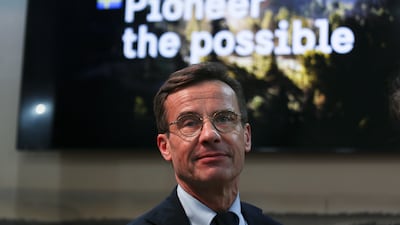Sweden's new government has published its first budget, and wants to raise spending overall but slash international aid.
Prime Minister Ulf Kristersson said Sweden planned to reduce the country's international aid by 7.3 billion kronor ($673 million) in 2023, and by another 2.2 billion kronor in 2024.
It also plans to raise spending by around 40.4 billion kronor ($3.71 billion) in 2023, it said on Tuesday, outlining its first budget since September’s general election.
Sweden is one of the world's biggest international donors and the cuts presented Tuesday represent a roughly 15 per cent reduction on what had been planned by the previous left-wing government.
It means Sweden will abandon its foreign aid target of 1 per cent of gross national income — which is above the UN suggested 0.7 per cent.
International aid for refugees will be capped at a maximum of eight per cent of its aid, and will also be reduced.
The new government, which is backed for the first time by the anti-immigration Sweden Democrats, had announced in its programme last month that it would be cutting foreign aid.
Website Donor Tracker says Sweden was the world's eighth-biggest international aid donor in terms of absolute value last year, and the third-biggest in proportion to the size of its economy, donating 0.92 per cent of its gross national income, behind Luxembourg and Norway.
Despite its growth forecast being revised downwards — the economy is expected to shrink by 0.4 per cent next year and grow by 2 per cent in 2024 — the 2023 budget forecasts a surplus of 0.7 per cent of gross domestic product.
It calls for an additional 40 billion kronor in spending, with rising envelopes for crime fighting and the building of new nuclear reactors, as well as a reduction in taxes on petrol and an increase in the defence budget.
The new government is a minority coalition made up of Mr Kristersson's conservative Moderates, the Christian Democrats and the Liberal party, backed in parliament by their key ally the Sweden Democrats to give them a majority.
In Britain, a spiralling migrant crisis is on track to eat up almost half of its foreign aid budget as the record number of people arriving via illegal routes places unprecedented strain on the system.
The huge influx of boats crossing the English Channel, coupled with the cost of hospitality for Ukrainians fleeing the Russian invasion, will push the Treasury’s spending on UK immigration to as much as £3.5 billion.
By being considered part of Britain’s contribution to international development, the sum will make up around half of the foreign aid budget, The Times reported.
About 0.3 per cent of gross national income will be spent on projects overseas, less than the government’s target of 0.5 per cent, set during the Covid-19 pandemic.
The reductions to Britain's foreign aid budget affected the amount of cash allocated to overseas projects in places such as Afghanistan, Yemen, Ethiopia and the Palestinian Territories.
Vital projects across Africa, where the UK has historically been a large provider of aid, took a big hit.


